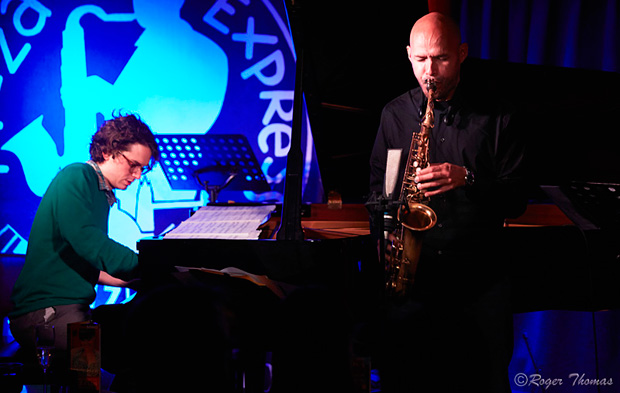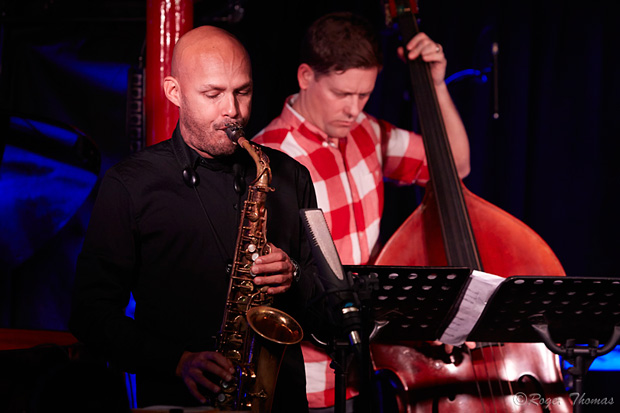Bobby Avey sharply provocative at Pizza Express Jazz Club
Friday, December 5, 2014
The contention that jazz has lost its political edge was clearly upended by some well-chosen words at the start of this absorbing performance.

American pianist and composer Bobby Avey could have restricted himself to saying that his extended suite Authority Melts From Me, recently issued to favourable notices on Whirlwind, was inspired by the 1791 Haitian revolution and the Voudou rituals that are integral to the island’s African heritage.
Yet Avey did not skirt around the key issue: the aforesaid insurrection is the only noted historical example of slaves overthrowing their colonial masters and it understandably captured the imagination of fearless West Indian radicals such as C.L.R James, author of seminal text The Black Jacobins. It also raises the question of why such an obviously cinematic subject has been denied adequate representation in the mainstream film industry: presumably because western imperialism getting its ass kicked doesn't sit too well with Hollywood executives who can't quite see Idris Elba as a credible Toussaint L’Ouverture, if they even know who the great rebel leader was in the first place. This may not have crossed the minds of the audience as Avey hit the downbeat but his opening verbal salvo provided a clear socio-cultural context for a grandly ambitious piece.

Clocking in at the best part of 55 minutes, Authority… is a dense, multi-layered, restless and ultimately challenging work that showcases an A-list quintet in which alto saxophonist Miguel Zenón, arguably one of the instrument’s leading contemporary exponents, and guitarist Ben Monder shoulder the bulk of the improvisatory weight while drummer Jordan Perlson and double bassist Michael Janisch negotiate the most testing rhythmic intricacies. Avey, sideman to sax great Dave Liebman as well as the winner of the Thelonious Monk Institute Prize For Composition, based the suite on the drumming patterns of a Voudou ceremony in Haiti he personally attended in 2012. While a percussive character can be heard in many of the parts written for all the instruments, there is also a sense that Avey had paid close attention to the vocal chants that are central to Haitian music, which he blended with his own largely dissonant melodic sensibilities.
The result is a string of thrilling moments in which the strength of the improvising matched the richness of the written material. Janisch, handling tricky changes of time and tempo, mostly plays quite terse, pared down phrases in which a lot of low, often open notes make his sound the booming bass drum to the treble of Perlson’s snapping rimshots. Between them the two musicians are a highly effective evocation of the crucial ‘Gwo’ and ‘Ti’ bakas found in Caribbean folkloric groups.

Zenón, Monder and Avey greatly enrich this foundation but the suite is let down by a narrative arc that often becomes too digressive. Sadly some of the most enticing moments are the briefest, and what is arguably the rhythmic apex of the work, a passage in which Monder’s razor-sharp finger-picking is reinforced by a tightly drilled repeated line from Zenón and a pummeling attack from Avey is over just as a voltage of trance is beginning to crackle around the room. That was a groove to expand not contract. Elsewhere there could have been greater use of Monder’s guitar as an added rhythmic layer given the rapier precision with which he can play spiraling single note lines.
Any suite lives or dies on light and shade, pacing and breathing space, and there is a feeling that the score is just too top-heavy at times. That said Authority… is a sharply provocative piece that highlighted Avey’s compositional ability in no uncertain terms and was practically the main course that preceded the smaller starters in the second half. With more lyrical themes and fewer structural shifts, songs such as ‘Composure Must Be Rare’ and ‘Late November’ fully engage the audience and also give Avey a chance to reveal his considerable skill as a soloist, which is characterised by a refreshingly subtle use of the right hand, withholding standard lengthy chromatic flourish and opting for a much more staggered, choppy approach to line construction.
Perhaps most impressively the band hits its peak on a smartly re-harmonised version of Joni Mitchell’s ‘Woodstock’ in which the emotional depth of the lyric is vividly rendered by a blend of romanticism, nostalgia and detachment in the improvisations, particularly Zenón’s. He sings sweetly, but with a wry, salty kick.
This packed, wide ranging concert showed that Bobby Avey is a talent to be more than reckoned with and if he continues to fine-tune his ideas there is every chance of him making a major musical statement sooner rather than later. Whether Tinseltown’s powerbrokers wisely pay heed to the historical framework of his music remains to be seen.
– Kevin Le Gendre
– Photos by Roger Thomas